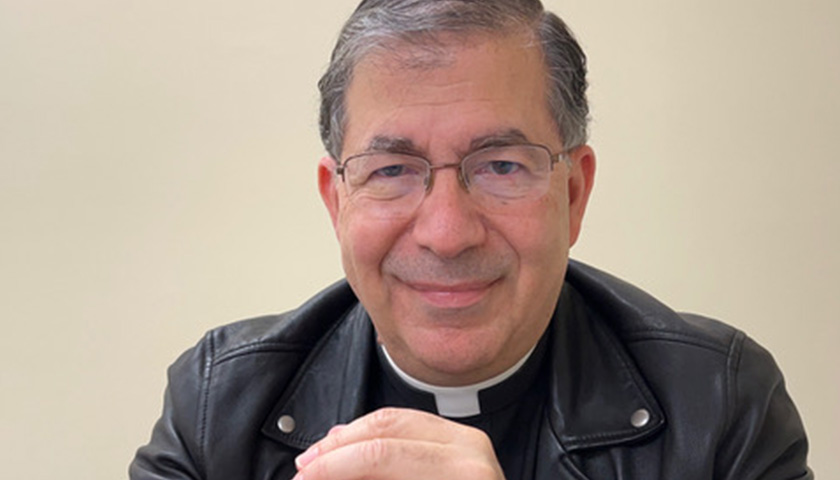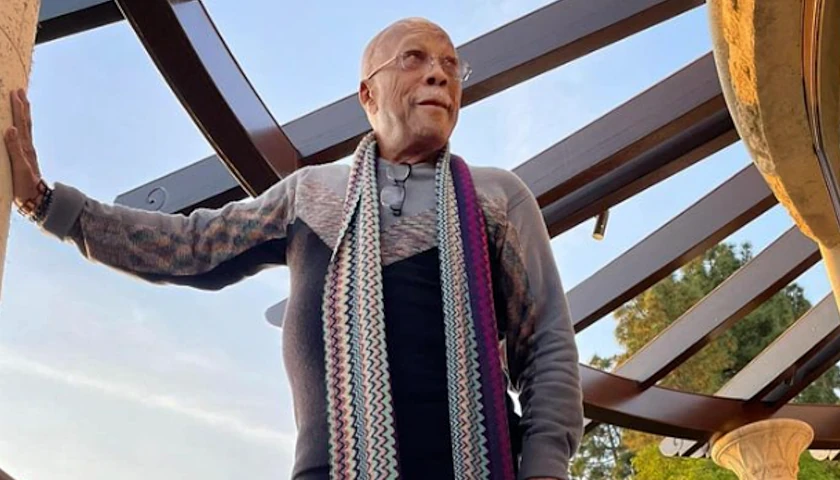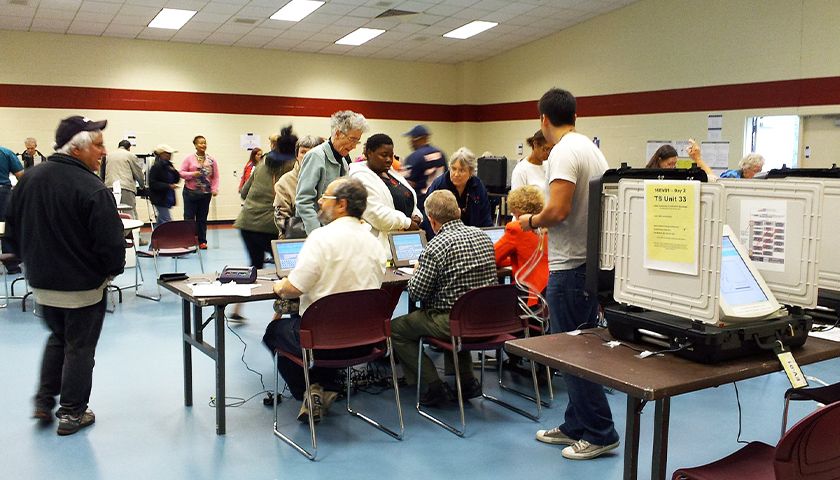by Jason Jones
There’s been a flurry of commentary in Catholic circles since Pope Francis decided to defrock pro-life advocate and priest Frank Pavone. One suggestion I’ve seen from many Catholic writers is that Francis is punishing Pavone because he believes clergymen should not be involved in politics. It’s a laughable argument. Francis is very frequently involved in politics and regularly encourages (leftist) priests in their activism.
And that really does get to the heart of the matter: What we’re witnessing in the debate over Pavone is a battle between two different kinds of Catholics who each have two irreconcilable concepts of the Catholic Church and its role in the world.
On the one hand, there are Catholics, many of them supporters of Pavone, who believe that the Church has been entrusted with immense power for good and is capable of transforming and Christianizing the world for the sake of the most vulnerable members of the human race.
On the other hand are Catholics, Francis foremost among them, who believe that the Church has no unique power of its own, and therefore must participate in politics in just the way any other organization might — by pandering to the powerful, shunting politically inconvenient members off to the side, and turning a blind eye to anything its worldly allies would prefer to keep quiet.
Pavone and the Power of the Church
In Ecclesiastes, King Solomon showed great insight when he recognized that even the greatest king — which he was — is powerless in the eyes of God. “I saw all the oppressions that are done under the sun,” Solomon lamented. “On the side of their oppressors there was power, and there was no one to comfort them.”
What many of Pavone’s detractors forget (or pretend to forget) is that Catholic clergy have never shied away from politics, and have always served as an answer to Solomon’s prophetic prayer. They engaged in politics not by vying with worldly leaders for equal status, but by showing forth a great power and authority from beyond the world, so to speak — asserting a law above the arbitrary dictates of political regimes.
In particular, Catholic clergymen have always been called to serve as courageous and unbending witnesses against any worldly power that tramples on the dignity of their neighbors. Because they understood that those neighbors — especially the most oppressed and vulnerable among them — are the children of an almighty and jealous God.
That witness on the part of our ordained apostles is the Church’s power, and it has shaped the political fate of nations throughout history. It transformed Europe from a dying empire rife with corruption, slavery, infanticide, and sex trafficking into a Christendom that honored the dignity of the least of its subjects. And that Christendom in turn gave rise to all the best aspects of our modern world, complete with international laws protecting vulnerable minorities, and human rights courts to keep secular rulers in check.
And clearly, Pavone’s witness to the dignity of pre-born children is at least recognizably an exercise within the same tradition. When he was drumming up support for Donald Trump in the lead-up to the 2016 presidential election, I confronted him about it in person. He said “Trust me,” and I made the decision to temper my opposition to Trump, keeping it quiet.
I admit, in fact, that I would have been a public “Never Trumper” if it were not for the calm certainty that this veteran of the pro-life movement expressed to me about Trump’s newfound devotion to the pro-life cause. And even after Trump won, I still had every intention of rubbing it in Pavone’s face when Trump betrayed the pro-life movement. But then, far from betraying us, Trump gave us one, two, then three courageously pro-life justices of the Supreme Court — and eventually the repeal of Roe v. Wade.
To be perfectly clear: I now truly believe that because of his strange, mysterious decision to rally pro-lifers in 2016, Pavone is the one man most directly responsible for the repeal of Roe.
And looking through Church history, it shouldn’t surprise us that an ordained minister of the Church, armed only with what John Paul II called the Gospel of Life, could make that kind of difference.
The power of the Church to speak with God’s own authority on behalf of His children has brought empires to their knees, and would have been the envy of King Solomon himself, the greatest king God’s people ever had.
The Power of Pope Francis
Solomon said that in all the oppression under the sun, power was on the side of the oppressors. Today, we can say that Francis is on the side of all the oppressors under the sun.
We began to see the pattern soon after his ascent to the papacy. The families of dissidents jailed by the communist regime in Cuba complained bitterly after Francis visited the country in 2015. He met with the leaders of the oppressive government, but not the “white widows” of its political prisoners.
Since then, Francis has drawn similar unanswered pleas on the part of numerous other oppressed groups and their advocates, from Afghanistan to Africa.
This year in Nicaragua, where the ruthless dictatorship of Daniel Ortega is more and more violently cracking down on Catholics, “advocates fear that Francis’ muted stance, coupled with the absence of a major international backlash, has only emboldened Ortega,” RealClearPolitics recently reported.
And in China, where millions of religious and ethnic minorities languish in concentration camps and Xi Jinping promises to crush religious critics of his genocide:
Francis struck a deal with Beijing that legitimized the government-approved “patriotic church” in the country — to the consternation of independent clergy across China and Hong Kong.
More recently, the pontiff declined to speak out against the sham trial of Joseph Zen, a 90-year-old retired cardinal of the Catholic church in Hong Kong. Zen was convicted of violating a new “national security” law in late November because of his outspoken advocacy for human rights, political freedom, and religious liberty. The charges can carry a life sentence.
God’s Constituency
We’ve heard enough of the argument that Pope Francis has the right to defrock Pavone, and that Pavone should be obedient. Let me get that argument out of the way here — by conceding it. Of course Pope Francis has the authority to defrock priests! And much more.
For example, he could oust the illegitimate bishops that the Chinese Communist Party put in place to facilitate the atheist regime’s campaign of terror against Catholics. He could defrock any number of prelates, some of them friends of his, who used their priestly authority to sexually abuse members of the faithful. Or he could crack down on Fr. James Martin for speaking at the Democratic National Committee in 2020.
But Francis instead used his authority to defrock the most well-known and effective advocate for the unborn among America’s clergy. The question isn’t whether Francis had the right to do that, but why he did it, and what it says about the state of the Church under Francis.
And the answer is clear: Francis goes out of his way to crush Pavone while remaining silent in the face of tyrants because Pavone’s constituency is the powerless child in the womb, while the constituency of Francis’ allies is men like Xi Jinping — powerful and vengeful rulers of this world.
But in choosing the path of worldly power, Francis is only making the same mistake as every other forgotten despot the Church has seen come and go throughout her history: He forgets that the powerless and oppressed are God’s constituency.
And He will not be mocked.
– – –
Jason Jones is a film producer, author, activist, popular podcast host, and human rights worker. He is president of the Human Rights Education Organization (H.E.R.O.) and the director of The Vulnerable People Project.




